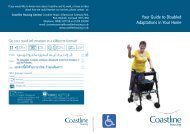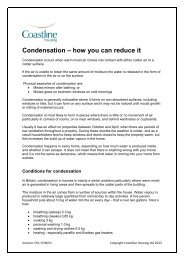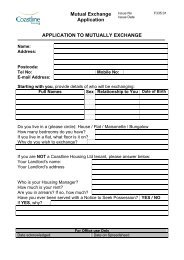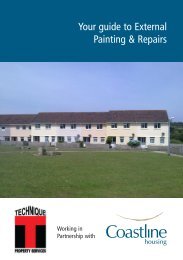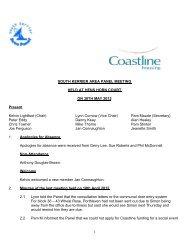Sewage plant leaflet - Coastline Housing
Sewage plant leaflet - Coastline Housing
Sewage plant leaflet - Coastline Housing
Create successful ePaper yourself
Turn your PDF publications into a flip-book with our unique Google optimized e-Paper software.
Common chemicals<br />
Washing machine and dishwasher detergents - perfectly alright in normal<br />
concentrations and usage. Problems can occur if for instance you are washing the<br />
jerseys of the local rugby club.<br />
Floor cleaners, disinfectant and bleaches - again these are safe to use in<br />
accordance with the maker's recommendations. What you should refrain from doing<br />
is pouring neat disinfectant and bleach down the sink or outside gully. If these smell<br />
it is likely there is a build-up of decaying material or a plumbing problem that should<br />
be dealt with accordingly.<br />
Nappy disinfectant and bottle sterilizing fluids like Milton - when disposing the used<br />
fluid ensure that it is well diluted with water. The easiest way of doing this is to flush<br />
it away down the toilet.<br />
Drain and pipe cleaning solutions like Mr Muscle - these must not be used where a<br />
property is connected to a septic tank or treatment <strong>plant</strong>. One sachet is strong<br />
enough to kill all the bacteria in a <strong>plant</strong> that serves around 20 properties.<br />
Waste disposal units - these do not inhibit the micro-organisms but they can present<br />
the <strong>plant</strong> with a considerable extra load. It is much better and more environmentally<br />
friendly to compost your vegetable peelings.<br />
Home beer and wine making - this presents a similar problem to waste disposal<br />
units. A treatment <strong>plant</strong> works as hard to treat one pint of beer as it does to treat the<br />
normal waste of one person in 24 hours. Therefore when disposing ensure it is well<br />
diluted with water.<br />
Out of sight, out of mind<br />
The average family produces 600 litres of waste water a day, equivalent to eight<br />
dustbins.<br />
Here are the top ten harmful substances and items that must not be discharged to<br />
the drains:<br />
• Cooking oil and fat – bag and bin<br />
• Cotton buds, condoms and disposable contact lenses – bag and bin<br />
• Disposable razors and hypodermic needles – talk to Cornwall Council or your<br />
health care provider to arrange safe disposal of hypodermic needles<br />
• Disposable nappies, sanitary towels, backing strips, tampons and panty liners<br />
– bag and bin<br />
• Weed killers, insecticides, fungicides and other gardening chemicals - take to<br />
a local authority collection point<br />
• Wet wipes and facial wipes – bag and bin<br />
Version: CHL SEW/V1 Copyright <strong>Coastline</strong> <strong>Housing</strong> Ltd 2013



